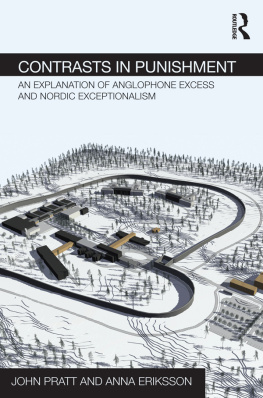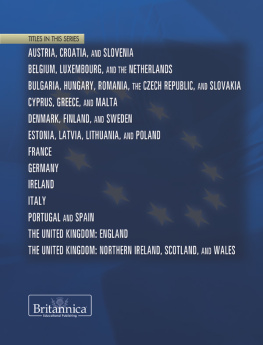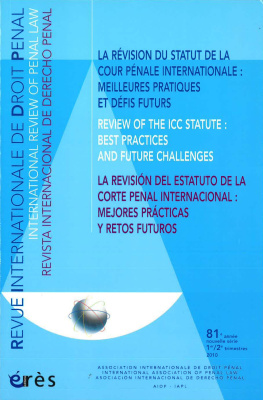Contrasts in Punishment
Why do some modern societies punish their offenders differently to others? Why are some more punitive and others more tolerant in their approach to offending, and how can these differences be explained? Based on extensive historical analysis and fieldwork in the penal systems of England, Australia and New Zealand on the one hand, and Finland, Norway and Sweden on the other, this book seeks to address these underlying questions.
The book argues that the penal differences that currently exist between these two clusters of societies emanate from their early nineteenth-century social arrangements. The Anglophone societies were dominated by exclusionary values systems, in contrast to the more inclusionary values of the Nordic. The development of their penal programmes over this two-hundred-year period, including the much earlier demise of the death penalty in the Nordic countries and the significant differences between the respective prison rates and prison conditions of the two clusters, reflects the continuing influence of these values. Indeed, in the early twenty-first century these differences have become even more pronounced.
John Pratt and Anna Eriksson offer a unique contribution to the growing importance of comparative research in the history and sociology of punishment. This book will be of interest to those studying criminology, sociology, punishment, prison and penal policy, as well as professionals working in prisons or in the area of penal policy across the six societies that feature in the book.
John Pratt is Professor of Criminology at Victoria University of Wellington, New Zealand. From 20092012 he was also a Royal Society of New Zealand James Cook Research Fellow in Social Science, and from 20102011 he was a Fellow of the Straus Institute for Advanced Studies of Law and Justice at New York University. He has published extensively in the areas of the history and sociology of punishment and comparative penology. In 2009 he was awarded the prestigious Radzinowicz Prize by the Editorial Board of the British Journal of Criminology.
Anna Eriksson is a Senior Lecturer in Criminology at Monash University, Melbourne, Australia. In 2009 she was awarded the New Scholar Prize by the Australian and New Zealand Society of Criminology for best publication, and in 2012 was the recipient of one of only two Australian Research Councils Awards for early career researchers in criminology, funding a three-year study on comparative punishment between Australia and Sweden.
Routledge frontiers of criminal justice
Sex Offenders: Punish, Help, Change or Control?
Theory, policy and practice explored
Edited by Jo Brayford, Francis Cowe and John Deering
Building Justice in Post-Transition Europe
Processes of criminalisation within Central and Eastern European societies
Edited by Kay Goodall, Margaret Malloch and Bill Munro
Technocrime, Policing and Surveillance
Edited by Stphane Leman-Langlois
Youth Justice in Context
Community, compliance and young people
Mairead Seymour
Women, Punishment and Social Justice
Human rights and penal practices
Margaret Malloch and Gill McIvor
Handbook of Policing, Ethics and Professional Standards
Edited by Allyson MacVean, Peter Spindler and Charlotte Solf
Contrasts in Punishment
An explanation of Anglophone excess and Nordic exceptionalism
John Pratt and Anna Eriksson
Contrasts in Punishment
An explanation of Anglophone
excess and Nordic exceptionalism
John Pratt and Anna Eriksson
First published 2013
by Routledge
2 Park Square, Milton Park, Abingdon, Oxon, OX14 4RN
Simultaneously published in the USA and Canada
by Routledge
711 Third Avenue, New York, NY 10017
Routledge is an imprint of the Taylor & Francis Group, an informa business
2013 John Pratt and Anna Eriksson
The right of John Pratt and Anna Eriksson to be identified as authors of this work has been asserted by them in accordance with sections 77 and 78 of the Copyright, Designs and Patents Act 1988.
All rights reserved. No part of this book may be reprinted or reproduced or utilised in any form or by any electronic, mechanical, or other means, now known or hereafter invented, including photocopying and recording, or in any information storage or retrieval system, without permission in writing from the publishers.
British Library Cataloguing in Publication Data
A catalogue record for this book is available from the British Library
Library of Congress Cataloging-in-Publication Data
Pratt, John, 1949
Contrasts in punishment: an explanation of Anglophone excess and Nordic
exceptionalism/John Pratt and Anna Eriksson. 1st ed.
p. cm. (Routledge frontiers of criminal justice; 7)
Includes bibliographical references.
1. Punishment-Scandinavia-History. 2. Punishment-English-speaking
countries-History. 3. Criminal justice, Administration of
Scandinavia-History. 4. Criminal justice, Administration of-English
speaking countries-History. I. Eriksson, Anna. II. Title.
HV9960.S34P73 2012
364.60917521-dc23
2012023376
ISBN13: 978-0-115-52473-5 (hbk)
ISBN13: 978-0-203-09611-6 (ebk)
Typeset in Times New Roman
by Swales & Willis Ltd, Exeter, Devon
For Isabella
I murmured that I had no shoes; then I met a man who had no feet.
-old Persian proverb
Contents
Figures
Tables
This book developed almost by accident, with some lucky breaks and happy coincidences along the way, rather than being the product of some carefully worked out plan that was then rewarded with a generous research budget. It grew from an opportunity that occurred towards the end of 2003, when my employers, Victoria University of Wellington, announced that there was money available for seeding research but with the caveat that it had to be spent by the end of the year, otherwise it would be lost. At that time, New Zealands Labour-led coalition government had copied Tony Blairs utterly specious promise to be tough on crime, tough on the causes of crime. The inevitable consequences were a dramatically increasing prison population and, thus, overcrowded prisons, amidst a frenetic and usually uninformed public discourse on law and order. It was at this point that the idea suddenly came to me although I then had very little idea of what it would actually involve that I would like to do research on low imprisonment societies: how had they managed to avoid the fiasco that was taking place in New Zealand and similar Anglophone societies? Accordingly, I put in what proved to be a successful bid for some of the funding. This then allowed me, at very short notice, to undertake a European tour that lasted one month, during the course of which I visited a number of countries, including Denmark, Finland, Norway and Sweden (although not Iceland, which simply seemed too remote and too much of a special case because of its population size). I spent a few days in each country, visiting one or two prisons in each and having discussions with academics and civil servants.
Nils Christie, at the Institute of Criminology, University of Oslo, whom I already knew, arranged my trip to Norway, and also provided me with contact people in the other Nordic countries, particularly Henrik Tham at the Department of Criminology, University of Stockholm, and Tapio Lappi-Seppl at the National Research Institute of Legal Policy in Helsinki. It was the interest and encouragement of these three gentlemen, in particular, that made it possible for the Nordic research to develop as it did. I also recognized early on that, to maximise the value of any research that I undertook, it was going to be important to look at
Next page





